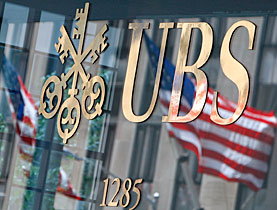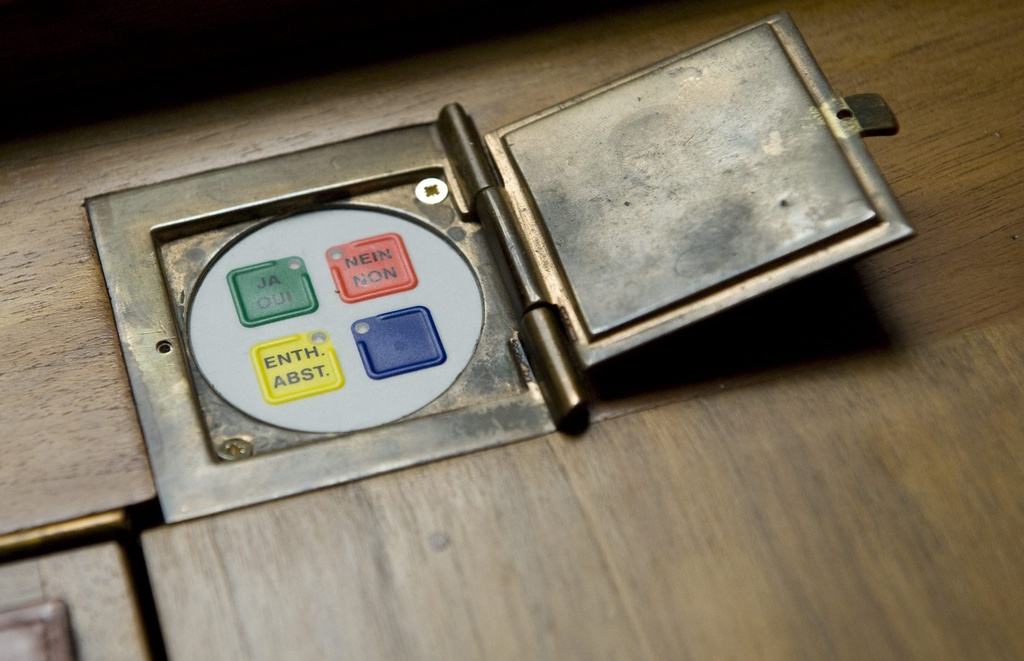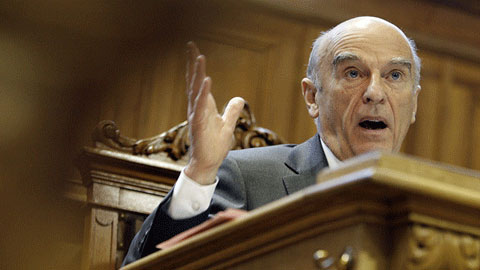UBS deal takes centre stage in parliament

The woes of Swiss bank UBS will play a central role in parliament’s summer session, which begins on Monday.
Other hot potatoes include the initiative to deport foreign criminals, proposed by the rightwing Swiss People’s Party, and the question of managers’ salaries.
On August 19, 2009, Switzerland and the United States reached a deal in a tax case that lifted the threat of crippling legal action against UBS but forced the bank to hand over confidential client data.
In trying to save UBS from further conflicts with the US, the government stepped in and upgraded the deal to a state contract subject to parliamentary approval afterward.
Switzerland has until August 20 to process the US request for administrative help concerning 4,450 client accounts held by US citizens at UBS. The Internal Revenue Service (IRS) originally wanted information on 52,000 clients.
With the ink on the settlement still wet, the government and those in charge at UBS breathed a sigh of relief – but prematurely: In January a Swiss court ruled that the handing over of confidential UBS bank details to US investigators by the Swiss authorities would be illegal.
In its decision, the court said only parliament can decide whether to hand the information over. It referred to a double-taxation agreement currently in place with the US that merely requires Switzerland to help American authorities with their investigations into cases of tax fraud – not tax evasion. (A new agreement with the US that provides help in cases of evasion as well has not yet been put into force).
“Perversion”
In the meantime, debate over the issue has grown heated. Justice Minister Eveline Widmer-Schlumpf described the deal as a “compromise between two sovereign states”.
At first, politicians of all colours were dismissive of the deal. Pirmin Bischof from the centre-right Christian Democratic Party described it as “yet another perversion of the state of law”.
Fulvio Pelli, president of the centre-right Radicals, was also critical, saying that “since UBS had created the catastrophe, it must be held responsible”.
Former Justice Minister Christoph Blocher, now figurehead and chief strategist of the People’s Party, which categorically rejected the deal for months for “castrating banking secrecy”, threatened to organise a referendum on banking secrecy.
The centre-left Social Democrats – fundamentally against banking secrecy – saw their chance and said they would vote for the deal as long as there were supporting measures.
The centre-right parties gave their backing through gritted teeth, arguing there was too much at stake were Switzerland to clash heads with the US.
Nervous
Since the People’s Party and the Social Democrats have a majority in the House of Representatives, cabinet ministers and bankers have been getting nervous.
The cabinet tried to appease the Social Democrats and on April 28 announced measures to tackle salary excesses, in particular the introduction of income tax on bonuses of more than SFr2 million ($1.72 million).
At the same time, it said banks that needed state support such as UBS would also be subject to increased regulation.
The government also felt there was a “need for action” in containing the problem of companies considered “too big to fail”.
However, the Social Democrats maintained their threatening front, saying they were tired of waiting for action and would oppose the settlement if parliament were not allowed to decide sooner on stiffer rules for banks.
“Evil”
But then on May 21 the People’s Party performed a U-turn and said such a tax on bonuses would harm the economy and that although the deal was an “evil”, rejecting it would be a bigger evil.
Since then the chances have looked good that the agreement would get through parliament.
Other emergency measures in favour of UBS were forced through by the government.
The People’s Party and the parties on the political left – the Social Democrats and the Greens – have for months been calling for a parliamentary investigative commission, which would throw light on the role of the government and Finma in the UBS affair.
The parties in the political centre think such a commission would only be necessary if questions remain unanswered after an investigation by another parliamentary commission, which would have fewer powers. That commission’s report was released on Monday morning.
…and also
Parliament will also have its hands full with various people’s initiatives, working out for example whether it wants to come up with a counterproposal to the so-called “rip off initiative” that deals with managers’ salaries.
Surveys show most members of the public back the initiative, which is why parties on the right are keen to take the wind out of its sails by coming up with a counterproposal.
If foreigners commit a crime, under current law they can be deported. The People’s Party’s deportation initiative wants to extend this and make optional deportation obligatory.
But legal experts say the initiative violates constitutional law, the European Human Rights Convention and Switzerland’s treaty with the EU regarding the free movement of people.
As a result in the spring parliamentary session the Senate came up with a counterproposal. Now the ball is in the court of the House of Representatives, whose preliminary discussions committee met the left half way – they had put up a fight against a tightening of the law – and added an article to the counterproposal forcing the government to implement additional integration measures.
Andreas Keiser, swissinfo.ch (Translated from German by Thomas Stephens)
UBS is the world’s number two wealth manager by managed assets and Switzerland’s second largest bank.
It has a workforce of more than 76,000 worldwide, including nearly 30,000 in the US.
In February UBS paid a $780 million fine and given information on 255 clients after admitting that some of its bank employees had helped US citizens evade taxes.
UBS, which benefited from a multi-billion bailout package by the government, posted a record loss in 2008.
On May 14, 2008, former UBS employee Bradley Birkenfeld and a Liechtenstein businessman were charged by the US authorities with helping an American billionaire avoid paying taxes on $200 million of assets deposited in Swiss and Liechtenstein bank accounts.
Birkenfeld turned whistleblower, giving details of UBS private banking practices to US prosecutors.
In July, a Miami court authorised the Internal Revenue Service to issue a summons on UBS demanding the release of confidential information on clients the agency suspected of tax evasion.
In the same month, UBS told a congressional hearing that it would stop offshore banking activities for US clients.
UBS agreed in February to pay $780 million and name some United States clients to resolve criminal fraud charges against it. However, this did not affect a separate demand from the IRS for the details of 52,000 UBS clients, in direct contravention of Swiss banking secrecy laws.

In compliance with the JTI standards
More: SWI swissinfo.ch certified by the Journalism Trust Initiative






You can find an overview of ongoing debates with our journalists here. Please join us!
If you want to start a conversation about a topic raised in this article or want to report factual errors, email us at english@swissinfo.ch.